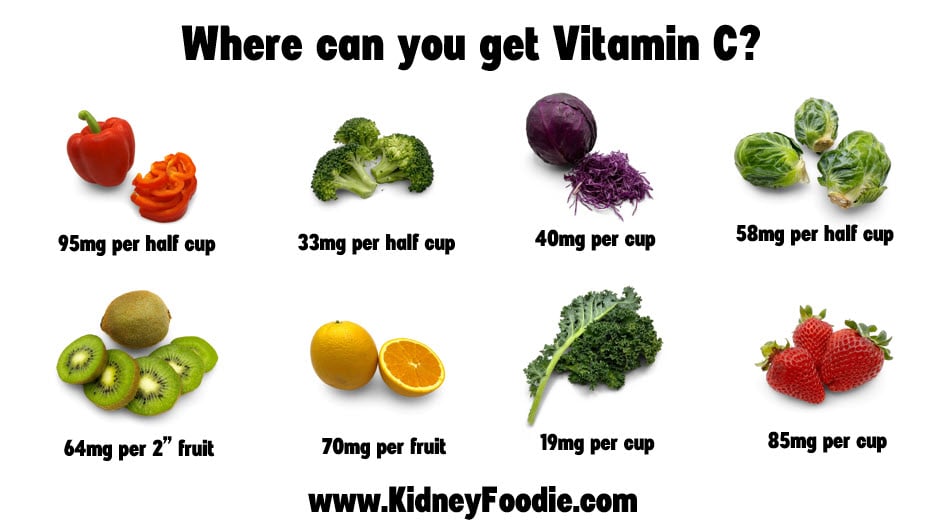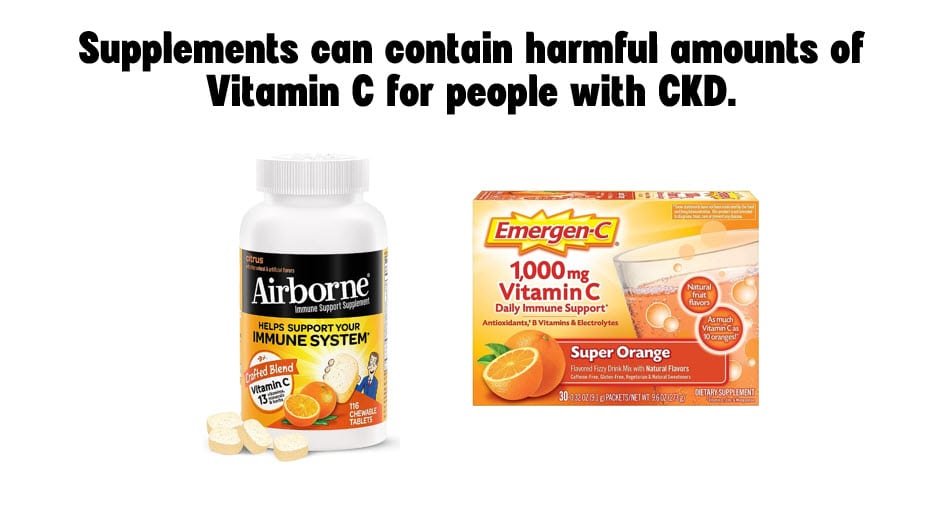What is Vitamin C?
Vitamin C is an essential vitamin that plays many important roles in our body. Vitamin C is well known for it’s role in supporting the immune system and helps to stimulate white blood cells that help fight infections.
This post may contain affiliate links through which we may earn a small commission to help keep this website free.
Vitamin C also helps with wound healing, which is especially important for people with diabetes who often have issues with delayed wound healing.
Vitamin C is also considered an antioxidant and can help neutralize free radicals in the body and protect against chronic diseases like kidney disease and diabetes.
Vitamin C can also improve iron absorption when foods high in Vitamin C are eaten with foods that contain iron.
How much Vitamin C do you need each day?
The recommended daily allowance for Vitamin C is 75mg per day for women and 90mg per day for men. A kidney friendly diet with adequate fruits and vegetables will easily meet the recommended daily allowance for Vitamin C.
For example, the average vitamin C content of the original sample CKD meal plans included in our Kidney Foodie Academy is 174mg for the CKD + Diabetes meal plan and an average of 236mg in the non-diabetes meal plan– so it is definitely possible to get plenty of vitamin C following a kidney friendly diet.
What are good sources of Vitamin C?
Fresh fruits and vegetables are excellent sources of Vitamin C. Although many people think of citrus fruits like oranges and grapefruits when they think of Vitamin C, other fruits and vegetables are also high in Vitamin C.

Here are a few examples of kidney friendly fruits and vegetables and how much Vitamin C they contain:
- ½ cup of chopped bell pepper has about 95mg of Vitamin C
- ½ cup of broccoli contains 33mg of Vitamin C
- One cup of shredded red cabbage contains 40mg of Vitamin C
- One half cup of cooked brussels sprouts contains 58mg of Vitamin C
- One 2” kiwi fruit contains 64mg of Vitamin C
- One orange contains 70mg of Vitamin C
- One cup of raw kale contains 19mg of vitamin C
- 1 cup of strawberries has 85mg of Vitamin C
Unfortunately, many people with CKD avoid fruits and vegetables because of their potassium content. Some people also boil their fruits and vegetables to remove the potassium, which destroys the Vitamin C.
Another source of vitamin C for many people are supplements, such as multivitamins. People with CKD should not take over the counter multi-vitamins due to the risk of toxicity for certain vitamins and minerals. However, all Renal vitamins will contain some amount of Vitamin C to ensure that you can meet your needs. Renal vitamins are a type of multi-vitamin that is specifically formulated for people with kidney disease.
Is too much Vitamin C bad for CKD?
Yes, too much vitamin C can be bad for people with kidney disease.
While it is very important for people with CKD to get adequate Vitamin C to support their immune system and all of the other wonderful things that Vitamin C does, there can be too much of a good thing.
Higher doses of vitamin C (500mg a day) have been shown to increase oxalate levels in your body. People with CKD are at increased risk for developing oxalates due to their decreased kidney function.
Oxalate can bind to other minerals and form kidney stones, which are very painful.
Oxalate can also deposit in your different organs and cause damage to these organs, including your kidneys. When oxalates deposit in the kidneys, it can lead to oxalate nephropathy, which can cause further damage to your kidneys.
It can deposit in your joints and cause joint pain. It can deposit in your bone and lead to fractures. It can also deposit in your skin, heart, blood vessels, eyes, etc.
People with CKD should avoid taking additional supplements of Vitamin C. This would include supplemental vitamins as well as supplements marketed for immunity boosting such as products like Emergen-C or Airborne. These products are not formulated for people with CKD and contain too much Vitamin C.

If you are deficient in Vitamin C, talk to your doctor about the right treatment. Short term use of a higher dose may be needed, but longer term high doses would not be recommended.
For people that want to get more Vitamin C, getting in adequate fruits and vegetables is the best way to increase Vitamin C intake. Fruits and vegetables will contain MANY other nutrients that are extremely beneficial for people with CKD. People who are concerned about the potassium content of eating more fruits and vegetables should consider learning more about how to effectively manage potassium in CKD. Many people with CKD do not need to follow a potassium restriction, and doing so could actually be doing more harm than good if you do not actually need to be on a potassium restriction.
